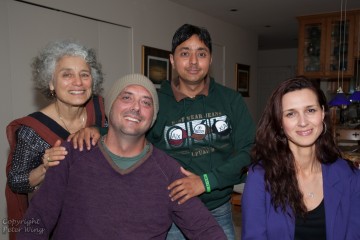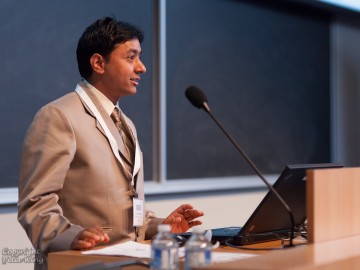2013
2013 has been another good year. Highlights have included:
- Drs Prakash’s and Raju’s successful performance in their second year of residency training and their partners’ development of new educational directions.
- Dr Prakash’s attendance at the Bethune Round Table conference in Vancouver in May – it was a real pleasure to have him visit (photos below).
- Dr Prakash’s successful completion in October of the Principles of Surgery examinations for the Pakistan College of Surgeons. At the close of the year, Dr Raju was working hard for the parallel exam in his program in Dhaka in early 2014 (he has now passed!).
- The planning and performance of two workshops, held in November – one for a surgical audience, sponsored jointly by SIRC, the Association of Spine Surgeons of Nepal, and Spine Nepal, the other for a rehab audience. Both trainees joined us as faculty for these workshops. More information below.
- The continuation of a good mentorship relationship with Drs Raju and Prakash over Skype or phone every couple of weeks – our conversations a lovely blend of mentorship, sponsorship and family support.
Developments at SIRC
A new physician, Dr Rupak, joined the staff of SIRC, but his plans soon took him elsewhere (more of this on the blog). A public health trained physician new to the world of spinal cord injury medicine, he was still apprehensive about some of the medical consequences and complications that can be seen. (Sadly, about one-third of our patients arrive with major pressure sores induced by many weeks of care in the acute environment where basic prevention methods are not adequately employed.) SIRC was fortunate to be able to hire Ms Chanda, a skill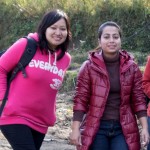 ed physiotherapist working as rehab-in-charge, and Ms Mandira, a psychiatrically-trained nurse who has a wonderful feel for the rehab issues of importance.
ed physiotherapist working as rehab-in-charge, and Ms Mandira, a psychiatrically-trained nurse who has a wonderful feel for the rehab issues of importance.
(Right – Chanda and Mandira on a recent home visit).-
Staff developments in Vancouver
- Dr Scott Paquette and partner Birgitte Bjorn – a spine surgeon with a neurosurgical
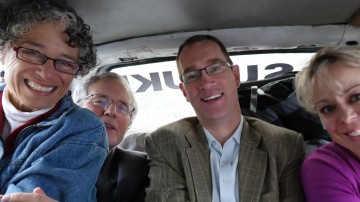 background and an educator and school principal – took part in the November workshops.
background and an educator and school principal – took part in the November workshops. - Dr Rhonda Willms and partner Wes Adrian – a physiatrist (rehabilitation specialist) working with people with SCI at GF Strong, and a retired teacher – also joined us in Nepal in November. (Right – from right to left: Rhonda, Scott, Peter, Claire, in a miniscule taxi en route to the workshops)
- Renee Maschke, a rehab physician, director of the SCI unit in Perugia, Italy, took part in the workshops and also spent time subsequently at SIRC. She hopes to return for a longer period of tutoring and mentorship.
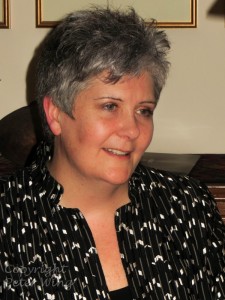
- Kate Coffey: (right), a financial planner and friend from Bowen Island, near Vancouver, arrived soon after we left. She expects to spend about five months in Nepal assisting SIRC management implement their recently-constructed strategic plan. Kate invites you to follow her blog here.
The Workshops
Despite the uncertainty engendered by the General Election held in November we organized and participated in two workshops a few days later, delaying the second workshop by a few days at the suggestion of the hospital board. The first, held collaboratively by SIRC with the relatively newly-formed Association of Spine Surgeons of Nepal and Spine Nepal (us), was attended by about 60 attendees at the Kathmandu Medical College, a very comfortable venue. We had some formal discussion of a number of spine topics, and lively discussion of a number of cases relating to trauma and degeneration, mostly presented by local faculty. One of t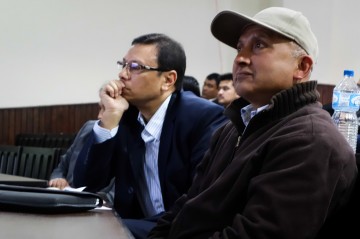 he most satisfying topics was the subject of spine associations, in a pair of talks given by Dr Rabindra Pradhan for the Nepalese surgeons and Scott Paquette for the Canadian Spine Society. The two groups have many interests in common, including the development of training objectives for spine fellowships. (Right – Drs Rabindra Pradhan – general secretary – and Rohit Pokharel -president – of the Association of Spine Surgeons of Nepal.)
he most satisfying topics was the subject of spine associations, in a pair of talks given by Dr Rabindra Pradhan for the Nepalese surgeons and Scott Paquette for the Canadian Spine Society. The two groups have many interests in common, including the development of training objectives for spine fellowships. (Right – Drs Rabindra Pradhan – general secretary – and Rohit Pokharel -president – of the Association of Spine Surgeons of Nepal.)
 Right: Participants in the spine surgical workshop held at Kathmandu Medical College – orthopedic and neurosurgical spine surgeons and trainees.
Right: Participants in the spine surgical workshop held at Kathmandu Medical College – orthopedic and neurosurgical spine surgeons and trainees.
Our trainees, Raju and Prakash, joined us for two days of workshops held at the Spinal Injury Rehabilitation Centre, addressing previously requested topics – back pain and spinal injury – over two days. For this, we were joined by the Swiss team from the Swiss Paraplegic Centre near Lucerne, visiting SIRC for three weeks of training, as well as Dr Renee Maschke from Perugia. Drs Raju and Prakash both presented papers summarizing issues relevant to SCI: Raju on the neurogenic bladder and Prakash on pain after SCI. The second day was highlighted by a series of well-received interactive sessions demonstrating examination techniques relating to the evaluation of low back pain. With healthy input from our 130 attendees we now have a good number of suggestions for the next workshops.
We helped develop a position paper on the use in Nepali citizens of stem cells – yes, even here we experienced the use of treatments without proven benefit. We are also working with SIRC staff and members of the Asian Spinal Cord Network (ASCoN) on developing a spinal registry from a couple of existing alternatives.
Finally – the subject of Funding. We and our colleagues who have helped us in Nepal remain completely self-funding with respect to costs of travel and accommodation when there. All received funding goes to support our trainees. We wish to thank our donors sincerely both for recognising the need for the funding and for your constancy in maintaining your support – it means a lot to our young doctors, to their future patients in the spinal system in Nepal and to the Spinal Injury Rehab Centre. And, of course, to us!
For up-to-date news of the program, please visit our blog from time to time.
